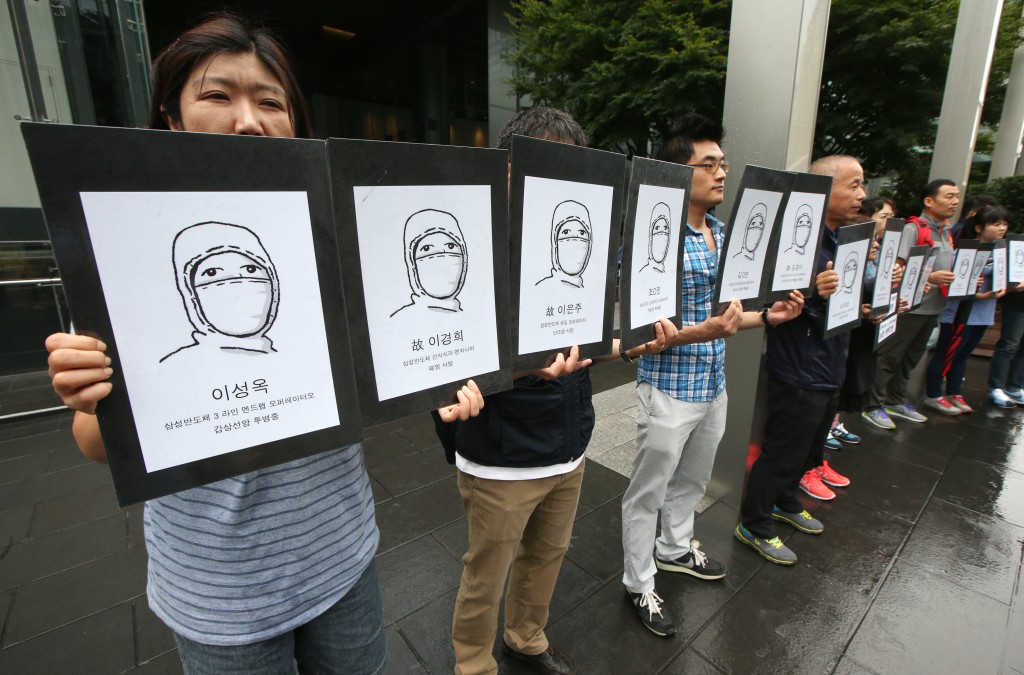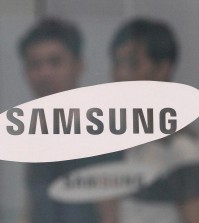- California Assembly OKs highest minimum wage in nation
- S. Korea unveils first graphic cigarette warnings
- US joins with South Korea, Japan in bid to deter North Korea
- LPGA golfer Chun In-gee finally back in action
- S. Korea won’t be top seed in final World Cup qualification round
- US men’s soccer misses 2nd straight Olympics
- US back on track in qualifying with 4-0 win over Guatemala
- High-intensity workout injuries spawn cottage industry
- CDC expands range of Zika mosquitoes into parts of Northeast
- Who knew? ‘The Walking Dead’ is helping families connect
Court rules death of ex-Samsung employee linked to work environment

An advocacy group dealing with deaths and illness among Samsung Electronics employees stages a protest in front of Samsung Electronics building. (Yonhap)
SEOUL (Yonhap) — A Seoul court ordered the government Friday to compensate a woman who died of a brain tumor after working at a Samsung Electronics Co. plant, recognizing her as an industrial disaster victim as her death was linked to the plant’s work environment.
Lee Yun-jeong, 32, died in 2012. She was diagnosed with a malignant brain tumor in 2010 after having worked at a Samsung semiconductor plant in central South Korea from 1997 to 2003.
The Korean Workers’ Compensation & Welfare Service (KCOMWEL), a government agency that compensates industrial disaster victims, refused to cover her medical treatment after a probe by the Occupational Safety and Health Research Institute (OSHARI) showed no link between her illness and the work carried out at the factory in Asan, some 80 kilometers south of Seoul.
Lee filed a lawsuit to reverse the decision in 2011 but died a year later.
Her widowed husband took over as plaintiff along with her former colleague, Yu Myeng-hwa, who was diagnosed with aplastic anemia, an irreversible blood disorder, in 2001. Yu, 32, had worked at the same factory from 2000 to 2003.
In Friday’s ruling, the Seoul Administrative Court said the plant’s environment appeared to have led to Lee’s death, saying the government should have covered the costs of her treatment.
It marked the first time that a brain tumor was recognized as a work-related disease at Samsung.
Lee was continuously exposed to harmful substances such as benzene, lead and formaldehyde during her stint at Samsung, Judge Lee Sang-deok said.
He added that Yu’s condition should also be categorized as a workplace accident and nullified the government’s decision to withhold her compensation.
“The two women worked day and night under an enormous amount of stress, which must have compromised their immune systems and caused their illnesses,” he said.
He said the probes carried out by OSHARI were inadequate to prove the lack of a causal relationship between the diseases and their work.
The investigations were conducted in 2010, by which time the work environment at Samsung plants should have improved from a decade earlier, the judge said.
KCOMWEL said it was waiting for prosecutors to decide whether it should file an appeal.
SHARP, an advocacy group for workplace accident victims at Samsung, welcomed the ruling and urged the government not to contest it.
“We hope this ruling serves as a belated consolation to Lee’s family,” the group said in a statement.
Five other former Samsung employees are waiting to be compensated for work-related brain tumors, the group added.
Samsung Electronics refused to comment on the ruling, saying it is neither a plaintiff nor a defendant in the suit.
A Samsung official, however, said the company was in the process of creating a committee that will negotiate with other victims of industrial disaster.
















Pingback: Medicalization of Marijuana—Reply